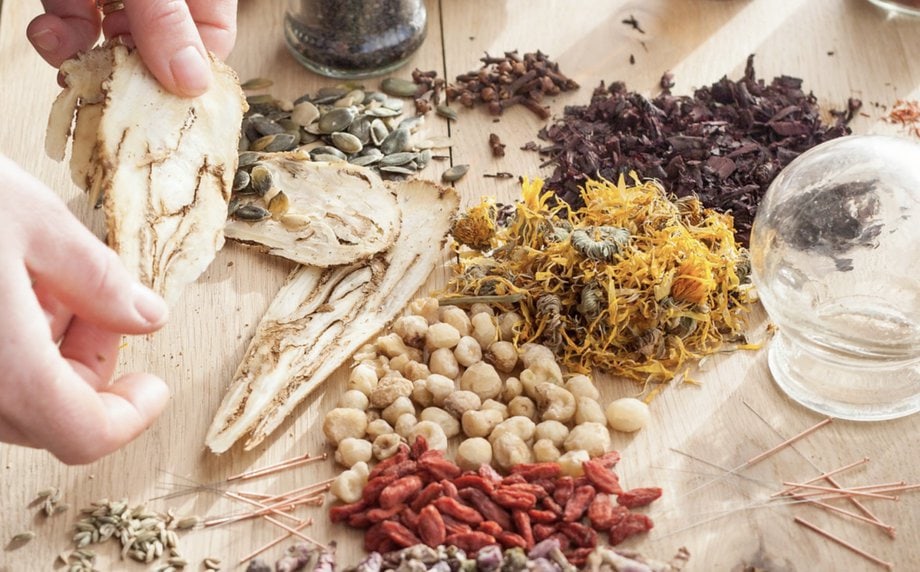Traditional Chinese Medicine And Mental Health: Holistic Approaches To Emotional Well-Being

Traditional Chinese Medicine (TCM) has been practiced for thousands of years and is rooted in the belief that the mind and body are interconnected. This holistic approach to health focuses on restoring balance and harmony within the individual.
In recent years, there has been growing interest in the use of TCM for mental health and emotional well-being. This article explores various aspects of TCM that can contribute to improving mental wellness.
First, acupuncture, a key component of TCM, is discussed as a holistic approach to mental wellness. This ancient practice involves the insertion of thin needles into specific points on the body to stimulate energy flow and restore balance.
Herbal medicine, another integral part of TCM, is explored for its potential benefits in treating mental health disorders.
Additionally, mind-body exercises such as Tai Chi and Qigong are examined as practices that promote emotional well-being. These exercises combine movement, meditation, and deep breathing to enhance the mind-body connection.
The article also considers dietary considerations and lifestyle modifications that can support mental wellness.
Finally, the role of TCM practitioners in mental health care is highlighted, emphasizing their ability to provide personalized, holistic treatment plans. By embracing the holistic approach of TCM, individuals can enhance their emotional well-being and achieve a state of balance and harmony within themselves.
The Philosophy of Traditional Chinese Medicine
The Philosophy of Traditional Chinese Medicine offers a comprehensive and holistic approach to understanding and promoting emotional well-being. It is based on the belief that emotions are an integral part of overall health and that the mind and body are interconnected.
According to this philosophy, emotional imbalances can lead to physical ailments, and vice versa. Traditional Chinese Medicine views emotions as energy that flows through the body, and when this energy becomes blocked or imbalanced, it can manifest as emotional distress or physical symptoms.
The goal of Traditional Chinese Medicine is to restore balance and harmony to the body and mind by addressing the root cause of the emotional imbalance. This approach includes various techniques such as acupuncture, herbal medicine, dietary therapy, and mind-body exercises like tai chi and qigong.
By treating the underlying causes of emotional imbalances, Traditional Chinese Medicine aims to promote long-term emotional well-being.
Acupuncture as a Holistic Approach to Mental Wellness
Acupuncture, an ancient practice, offers a comprehensive approach to promoting mental well-being. Derived from traditional Chinese medicine, acupuncture involves the insertion of thin needles at specific points on the body to stimulate the flow of energy, known as qi. By targeting these energy pathways, acupuncture aims to restore balance within the body and mind.
In the context of mental health, acupuncture is believed to address emotional imbalances and alleviate symptoms of anxiety, depression, and stress. Research suggests that acupuncture may modulate the release of neurotransmitters and hormones, promoting relaxation and reducing the perception of pain.
Additionally, acupuncture sessions often incorporate other elements such as herbal remedies, dietary recommendations, and lifestyle modifications to support overall mental well-being. Although further research is needed, acupuncture provides a holistic and non-invasive approach to mental wellness that is gaining recognition in Western healthcare settings.
Herbal Medicine for Mental Health
This discussion will focus on the use of herbal medicine for mental health, specifically Traditional Chinese Herbs for Emotional Balance and Customized Herbal Formulas.
Traditional Chinese Medicine (TCM) has a long history of using herbs to promote emotional well-being and restore balance in the body.
These herbs are often combined in customized formulas tailored to the individual’s specific needs, taking into account their unique symptoms and constitutional imbalances.
Traditional Chinese Herbs for Emotional Balance
Traditional Chinese herbs offer a natural approach to achieving emotional balance and promoting overall well-being. In Traditional Chinese Medicine (TCM), emotional well-being is closely linked to the balance of energy, or Qi, in the body. When Qi is disrupted or blocked, it can result in emotional imbalances such as anxiety, depression, or irritability.
Traditional Chinese herbs aim to restore the balance of Qi and address the root causes of emotional distress. Common herbs used for emotional balance include Bai He (Lily Bulb), Chai Hu (Bupleurum), and He Huan Pi (Mimosa Bark). These herbs are believed to have calming and uplifting properties, helping to regulate emotions and promote a sense of calmness.
However, it is important to consult a qualified TCM practitioner before using these herbs, as they can interact with medications and have potential side effects.
Customized Herbal Formulas
Customized herbal formulas are tailored to individual needs and aim to address specific imbalances in the body’s energy, promoting overall well-being.
In Traditional Chinese Medicine (TCM), each person’s constitution and energy patterns are unique, and therefore, a one-size-fits-all approach is not adopted. Practitioners of TCM carefully assess the patient’s symptoms, medical history, and overall health to determine the underlying imbalances that contribute to emotional issues.
Based on this assessment, a customized herbal formula is prescribed, which may consist of a combination of herbs that work synergistically to restore balance. These formulas often include herbs with properties that can nourish, tonify, invigorate, or calm the body’s energy, depending on the specific needs of the individual.
Customized herbal formulas in TCM provide a holistic approach to emotional well-being, targeting the root causes of imbalances while promoting overall health and harmony.
Mind-Body Exercises: Tai Chi and Qigong
This paragraph will discuss the key points of cultivating mindfulness and relaxation and improving emotional resilience through mind-body exercises such as Tai Chi and Qigong.
These exercises have been used in traditional Chinese medicine to promote emotional well-being and balance.
By engaging in these practices, individuals can enhance their ability to be present in the moment, reduce stress, and develop emotional resilience.
Cultivating Mindfulness and Relaxation
One effective approach to promoting emotional well-being is through the cultivation of mindfulness and relaxation techniques. These techniques are an integral part of traditional Chinese medicine (TCM) and are believed to have a positive impact on mental health.
Mindfulness involves paying attention to the present moment without judgment, while relaxation techniques aim to reduce stress and tension in the body and mind. TCM practitioners often recommend practices such as meditation, deep breathing exercises, and visualization techniques to cultivate mindfulness and relaxation.
These techniques have been found to reduce symptoms of anxiety and depression, improve sleep quality, and enhance overall well-being. While more research is needed to fully understand the mechanisms behind these effects, the incorporation of mindfulness and relaxation techniques into mental health treatments shows promise in promoting emotional well-being.
Improving Emotional Resilience
To enhance emotional resilience, individuals can develop strategies that foster adaptability and coping skills. These strategies can be beneficial in managing stress and improving overall well-being.
Traditional Chinese medicine (TCM) offers a holistic approach to emotional health, focusing on the interconnectedness of the mind, body, and spirit. Some ways to improve emotional resilience based on TCM principles include:
- Qi Gong: A practice that combines meditation, controlled breathing, and movement to cultivate energy flow and balance.
- Herbal remedies: TCM utilizes various herbs to support emotional well-being, such as adaptogens to enhance stress resilience.
- Acupuncture: By targeting specific points on the body, acupuncture can help regulate emotions and promote relaxation.
- Diet and nutrition: Eating a balanced diet with nourishing foods can support emotional stability and strengthen the body’s resilience.
- Mind-body exercises: Practices like Tai Chi promote mindfulness, relaxation, and physical strength, all of which contribute to emotional resilience.
These TCM approaches offer individuals a comprehensive framework for improving emotional resilience and promoting overall mental well-being.
Dietary Considerations for Mental Wellness
This discussion will explore the dietary considerations for mental wellness, focusing on nourishing the mind with Traditional Chinese Medicine (TCM) foods and balancing the five elements.
TCM emphasizes the use of specific foods to support mental well-being, considering their energetic properties and effects on the body.
Additionally, TCM views the body and mind as interconnected with the five elements (Wood, Fire, Earth, Metal, Water), and balancing these elements through diet can promote emotional and psychological health.
Nourishing the Mind with TCM Foods
Nourishing the mind with Traditional Chinese Medicine (TCM) foods involves incorporating a range of ingredients that promote emotional well-being and balance. TCM emphasizes the connection between the mind and body, viewing them as interconnected entities.
According to TCM principles, certain foods possess specific properties that can affect the mind and help maintain emotional equilibrium. To nourish the mind, TCM recommends incorporating the following foods into one’s diet:
- Black sesame seeds: Rich in nutrients and essential fatty acids, black sesame seeds are believed to nourish the brain and improve memory.
- Goji berries: Known for their antioxidant properties, goji berries are believed to enhance mood and relieve anxiety and stress.
- Longan fruit: Longan fruit is often used in TCM to calm the mind, relieve insomnia, and improve concentration.
- Mung beans: High in protein and rich in vitamins, mung beans are believed to have a cooling effect on the body and can help alleviate symptoms of irritability and restlessness.
By incorporating these TCM foods into one’s diet, individuals can support their emotional well-being and achieve a sense of balance and harmony.
Balancing the Five Elements
Balancing the five elements is an essential aspect of maintaining overall harmony and equilibrium in the body and mind. According to Traditional Chinese Medicine (TCM), the five elements (wood, fire, earth, metal, and water) are interconnected and influence each other. Each element corresponds to specific organs, emotions, and seasons. When one element is out of balance, it can affect the others and lead to disharmony and emotional distress.
To understand the concept of balancing the five elements, a table can be used to illustrate their relationships:
| Element | Corresponding Organ | Emotion | Season |
|---|---|---|---|
| Wood | Liver | Anger | Spring |
| Fire | Heart | Joy | Summer |
| Earth | Spleen | Worry | Late Summer |
| Metal | Lung | Grief | Autumn |
| Water | Kidney | Fear | Winter |
By identifying which element is dominant or deficient, TCM practitioners can prescribe specific treatments, such as acupuncture, herbal remedies, or dietary adjustments, to restore balance and promote emotional well-being. Balancing the five elements is crucial in TCM’s holistic approach to mental health, addressing both the physical and emotional aspects of an individual.
Lifestyle Modifications for Emotional Well-being
Implementing healthy lifestyle modifications can have a profound impact on one’s emotional well-being, as it involves cultivating a harmonious environment that promotes mental and physical health. Traditional Chinese Medicine (TCM) emphasizes the importance of lifestyle choices in maintaining emotional balance.
One key aspect is maintaining a balanced diet, as certain foods can affect mood and energy levels. TCM also encourages regular exercise, as it helps to circulate energy and promote emotional stability. Adequate sleep is another crucial factor, as it allows the body and mind to rest and rejuvenate.
Mindfulness practices such as meditation or tai chi are also recommended, as they help to calm the mind and reduce stress. Additionally, TCM emphasizes the importance of maintaining a supportive social network and engaging in fulfilling activities.
By incorporating these lifestyle modifications, individuals can enhance their emotional well-being and achieve a greater sense of balance and harmony in their lives.
The Role of TCM Practitioners in Mental Health Care
Transitioning from the discussion on lifestyle modifications for emotional well-being, it is important to explore the role of Traditional Chinese Medicine (TCM) practitioners in mental health care. TCM practitioners play a crucial role in providing holistic approaches to emotional well-being by addressing the underlying imbalances in the body that contribute to mental health issues. They utilize various techniques such as acupuncture, herbal medicine, dietary therapy, and mind-body exercises to restore balance and promote emotional well-being. In TCM, mental health is considered to be closely related to physical health, and practitioners aim to treat the root causes of emotional distress rather than just alleviating symptoms. By incorporating TCM practices, individuals may benefit from a comprehensive approach to mental health care that considers the interconnectedness of the mind, body, and spirit.
| Pros | Cons | |||
|---|---|---|---|---|
| Holistic approach to emotional well-being | Lack of scientific evidence | |||
| Addresses root causes of emotional distress | Limited availability in some areas | |||
| Incorporates mind-body exercises | May require longer treatment duration | |||
| Considers interconnectedness of mind, body, and spirit | Limited insurance coverage | May not be suitable for everyone | May require a willingness to explore and confront deep-seated emotions and traumas. |
Embracing the Holistic Approach to Mental Wellness
Embracing a comprehensive perspective on mental well-being involves recognizing the interconnectedness of various aspects of one’s life and considering multiple dimensions to promote optimal mental health.
In the context of traditional Chinese medicine (TCM), this holistic approach is central to the understanding and treatment of mental health issues. TCM emphasizes the balance and harmony of the mind, body, and spirit as key components of well-being. It recognizes that emotional imbalances can manifest as physical symptoms and vice versa.
Therefore, TCM practitioners utilize a range of approaches, including acupuncture, herbal medicine, dietary therapy, and lifestyle modifications, to address the underlying imbalances and restore harmony within the individual.
By taking into account the interplay between emotions, physical health, and lifestyle, TCM offers a holistic framework for promoting mental wellness and achieving overall balance and harmony in one’s life.
Frequently Asked Questions
How does Traditional Chinese Medicine view mental health conditions such as depression and anxiety?
Traditional Chinese Medicine views mental health conditions such as depression and anxiety as imbalances in the body’s energy flow. It emphasizes the importance of restoring balance through methods such as acupuncture, herbal medicine, and lifestyle adjustments.
Are there any potential side effects or risks associated with acupuncture as a holistic approach to mental wellness?
Potential side effects of acupuncture for mental wellness include minor bruising, soreness, and bleeding at the needle insertion site. There is also a small risk of infection or organ injury if performed improperly.
Can herbal medicine be used as a standalone treatment for mental health conditions, or is it typically used in combination with other treatment modalities?
Herbal medicine is often used as a standalone treatment for mental health conditions, but it can also be used in combination with other treatment modalities. Its effectiveness and safety should be evaluated on a case-by-case basis.
How do Tai Chi and Qigong specifically promote emotional well-being, and what is the recommended frequency and duration of practice?
Tai chi and qigong promote emotional well-being through their mind-body connection, focus on deep breathing, and gentle movements. Recommended frequency and duration of practice vary, but regular sessions of 30 minutes to an hour, several times a week, are generally recommended.
What are some specific dietary recommendations that Traditional Chinese Medicine suggests for improving mental wellness?
Specific dietary recommendations in traditional Chinese medicine for improving mental wellness include consuming warm and cooked foods, avoiding cold and raw foods, balancing yin and yang through food choices, reducing sugar and processed foods, and incorporating nutrient-rich foods such as fruits, vegetables, and whole grains.







